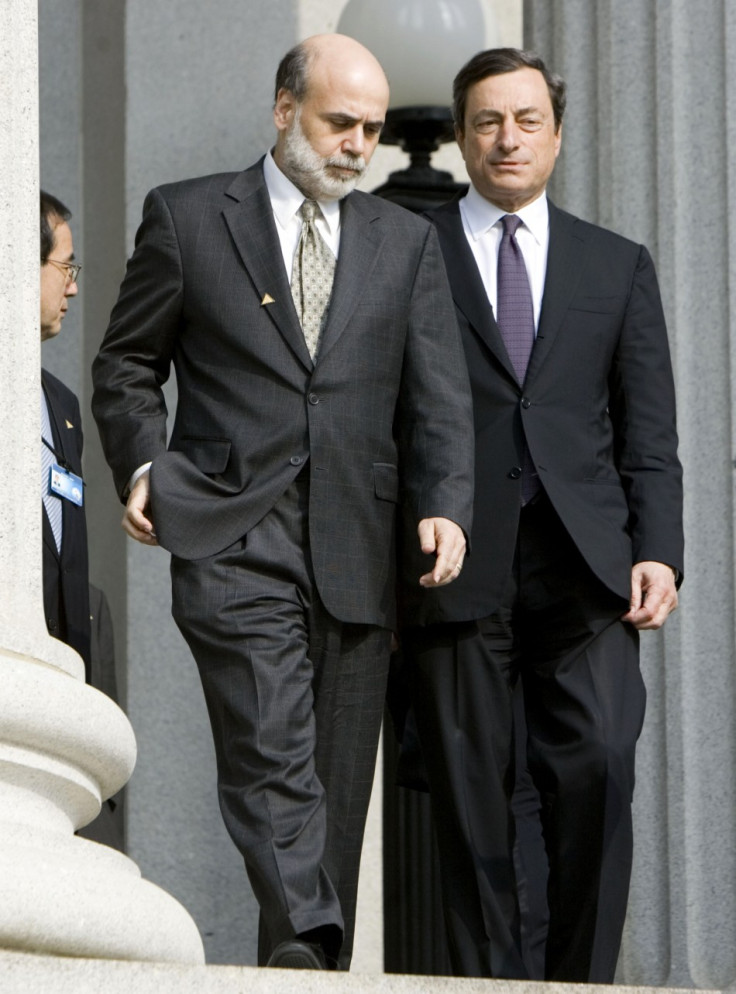Lock, Stock and Two Smoking Central Banks

"Now watch out for these fellas. They've got a bit of an arsenal, and they don't mind using it."
Wise counsel from Rory Breaker, a sadistic drug lord, to his burly henchmen as they prepared to kick down the door of rival gang in Guy Ritchie's stylised send-up of the London underworld: Lock, Stock and Two Smoking Barrels.
Global investors are staring down the metaphorical barrel of two smoking guns this morning after the US Federal Reserve matched the European Central Banks' pledge for an open-ended use of its own financial arsenal in one last assault on dysfunctional financial markets and sclerotic economic growth.
Collectively, the stewards of the world's two most important currencies have swallowed-up more than $5 trillion in financial assets in an effort to lower borrowing costs and, ultimately, entice investors into riskier, higher-returning ventures that provide more bang-for-the-economic-buck than the safe embrace of government debt.
Adding in activities from central banks in Britain, China, Japan and Switzerland takes the total to just under $13.5 trillion - a few bucks shy of an entire year's worth of US GDP.
Success thus far has been mixed: the ECB's verbal intervention has had a much greater impact on bond yields than previous programme of actual bond purchases, but neither seems to have compelled governments to definitely tackle the underlying structural reforms needed in their respective economies, and unemployment continues to rise.
Ditto the Fed, where Treasury bond yields are being pinned near record lows but with little corresponding improvement in the nation's labour market.
Meanwhile, currency weakness in both markets has investors trembling about a rise in inflation, pushing its traditional hedges (Gold, oil, and food prices) to multi-month highs.
In many respects, this is the central debating point of the entire concept of central bank intervention and quantitative easing: if commercial and investment banks are the sole mechanism by which misters Bernanke and Draghi transfer cash into the real economy, how can we be sure the banks will use the money for its intended purpose?
There's more than enough anecdotal to suggest they're not: the last ECB figures on money supply show a broad 3.8 percent expansion, but indicate contractions of 2 percent and 0.4 percent in consumer credit and non-financial business loans. Retail sales across the region are down 1.7 percent from last year, according to the last Eurostat figures.
Inflation, all the while, is rising at an uncomfortable 2.6 percent pace (in a flat-lining economy) and having no concurrent impact on wages (the fastest growth, in Germany, is still only 2.5 percent).
Parallel figures in the United States suggest similar difficulties: investor inflation expectation levels (gleaned from specific bond market yields) are at a 15-month high of 2.2 percent while the headline consumer price index is accelerating at 1.7 percent clip. US household income levels fell to the lowest level since 1989 last year and the nation's unemployment rate has topped 8 percent for nearly four years - the longest stretch since at least the Second World War.
The one bright spot that seems to have been lit by the Fed's QE torch - consumer credit growth - fell by $3.3bn in July (1.5 percent annualised) for the first time in nearly a year.
The principal beneficiary, it seems, has been the bond market: the Fed has gobbled-up $2.35bn in Treasury bonds, federal agency debt and mortgage-backed securities. Another $400bn was engineered through what it calls "Operation Twist" in which short-term bonds are sold (or matured) and replaced by longer-term securities.
Benchmark 30-year mortgage rates, according to weekly Freddie Mac figures, have undoubtedly declined - hitting a record low of 3.49 percent in July - but Mortgage Bankers' Association figures show new loan applications have fallen for the past five consecutive weeks.
Fresh US retail sales data - published Friday - showed a contraction (0.1 percent) in consumer spending (which fuels 70 percent of the economy) once you strip away big-ticket credit items like cars and back out inelastic gasoline sales.
So on both sides of the Atlantic, consumers are losing jobs, paying more for food and fuel and finding it harder to borrow from the bank.
In other words, demand stinks.
And that's the one thing central bankers' can't stimulate.
One of Lock, Stock's main characters, Bacon, tries to drum up a little demand of his own in the film's memorable opening scene that channels the comedy patios of centuries of Cockney street merchants: "Too late, too late" will be the cry when the man with the bargains has passed you by. If you got no money on you now, you'll be crying tears as big as October cabbages."
Right now, there's $13 trillion worth of enticement out there. And so far, it's had about as much impact as Bacon's street-corner sales pitch.
© Copyright IBTimes 2025. All rights reserved.





















